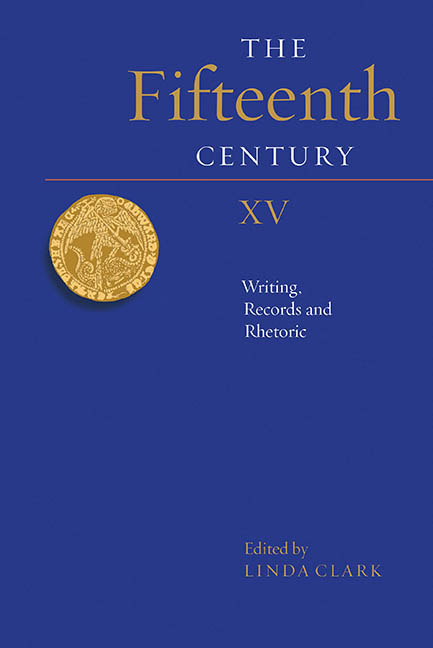Book contents
- Frontmatter
- Contents
- List of Illustrations
- Contributors
- Preface
- Abbreviations
- The Libelle of English Policy: The Matter of Ireland
- ‘Stories of Divers Regions and Provinces’: Some Digests of History and Geography for Late-Medieval English Readers
- ‘To please … Dame Cecely that in latyn hath litell intellect’: Books and the Duchess of York
- A Case Study in Lancastrian Service and Personal Survival: The Career of William, Lord Roos of Helmsley (c.1370–1414)
- Identity, Discourse and Political Strategy: Margrave Albrecht Achilles (1414–86) and the Rhetoric of Antagonism between Town and Nobility in Upper Germany
- The Redistribution of Forest Law and Administration in Fifteenth-Century England
- Well-Connected and Qualified Clerics? The Bishops of Dunkeld and Sodor in the Fifteenth Century
- Preaching Politics: Lancastrian Chancellors in Parliament
- Bishop John Alcock and the Roman Invasion of Parliament: Introducing Renaissance Civic Humanism to Tudor Parliamentary Proceedings
- Preaching on Magna Carta at the end of the fifteenth century: john alcock's sermon at paul's cross
- Index
- CONTENTS OF PREVIOUS VOLUMES
‘To please … Dame Cecely that in latyn hath litell intellect’: Books and the Duchess of York
Published online by Cambridge University Press: 23 August 2019
- Frontmatter
- Contents
- List of Illustrations
- Contributors
- Preface
- Abbreviations
- The Libelle of English Policy: The Matter of Ireland
- ‘Stories of Divers Regions and Provinces’: Some Digests of History and Geography for Late-Medieval English Readers
- ‘To please … Dame Cecely that in latyn hath litell intellect’: Books and the Duchess of York
- A Case Study in Lancastrian Service and Personal Survival: The Career of William, Lord Roos of Helmsley (c.1370–1414)
- Identity, Discourse and Political Strategy: Margrave Albrecht Achilles (1414–86) and the Rhetoric of Antagonism between Town and Nobility in Upper Germany
- The Redistribution of Forest Law and Administration in Fifteenth-Century England
- Well-Connected and Qualified Clerics? The Bishops of Dunkeld and Sodor in the Fifteenth Century
- Preaching Politics: Lancastrian Chancellors in Parliament
- Bishop John Alcock and the Roman Invasion of Parliament: Introducing Renaissance Civic Humanism to Tudor Parliamentary Proceedings
- Preaching on Magna Carta at the end of the fifteenth century: john alcock's sermon at paul's cross
- Index
- CONTENTS OF PREVIOUS VOLUMES
Summary
In 2009, Livia Visser-Fuchs offered what she called a ‘bio-bibliography’ of Richard, duke of York. In it she suggested that a collection of books ‘through their contents and the manner in which they were acquired, reveal things about the owner not found in narrative and documentary sources’. She noted that the six books that were then associated with the duke of York constituted a tiny collection that was far less adequate to the task she had undertaken than the twenty owned or associated with his son Richard III. Nonetheless, Visser-Fuchs was able to offer new and very personal insights into Richard, duke of York's life. York's wife, Cecily Neville, offers a significantly different prospect. As a result of the record in her household ordinances that she regularly listened to one of seven named devotional books, Cecily has become a familiar exemplar in studies of female book ownership, piety and mysticism. Yet this perception of Cecily as a pious reader or listener does not do justice to the wealth of surviving information about her relationship with books. In total there are some fifty-three works, in different forms, that can be associated with the duchess of York in her adulthood. It is also possible to list a number of books in her mother's possession with which Cecily is likely to have been familiar in her youth. The purpose of this article is to draw attention to the broader literary culture that Cecily inhabited, thereby offering a ‘bio-bibliography’ that is more appropriate to her varied career.
As the daughter of Joan Beaufort, countess of Westmorland, Cecily had grown up with a striking role model of book ownership. Joan Beaufort was clearly recognised by her contemporaries as a lady who appreciated books, someone who might be expected to provide patronage to authors, and indeed who was interested in a wide variety of literature. The most precious possessions mentioned in Joan Beaufort's will included two books. One was a psalter that had previously belonged to her own mother, Katherine, duchess of Lancaster (John of Gaunt's last duchess), so it brought with it a memory of Joan's royal heritage, as well as its own intrinsic value. The other book was ‘quemdam [sic] librum magnum de Fisica’ (a certain great book of Physic).
- Type
- Chapter
- Information
- The Fifteenth Century XV , pp. 37 - 56Publisher: Boydell & BrewerPrint publication year: 2017

